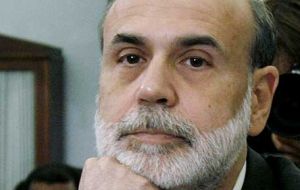MercoPress. South Atlantic News Agency
Markets’ expecting more signals in support of the dollar from US officials
 Ben Bernanke said the Fed has the tools to pull back flood of cash
Ben Bernanke said the Fed has the tools to pull back flood of cash Following a week when the US dollar plunged to record lows forcing some Asian banks to support the greenback, money markets are looking for new signals that the US government is committed to a strong US dollar as was implicitly anticipated by the Federal Reserve.
The Federal Reserve must continue to prop up the economy for an extended period but can't do so indefinitely for fear of triggering an inflationary surge, Federal Reserve Chairman Ben Bernanke warned last week.
The US central bank has cut interest rates to near zero percent and pumped hundreds of billions of dollars into the financial system to counter the worst financial crisis since the Great Depression.
At a Fed conference, where he discussed the central bank's ballooning balance sheet, Bernanke made clear that policymakers were thinking how to terminate support as recovery sets in.
“Accommodative policies will likely be warranted for an extended period,” Bernanke told participants at the conference held in the Fed's headquarters. “At some point, however, as economic recovery takes hold, we will need to tighten monetary policy to prevent the emergence of an inflation problem down the road.”
Bernanke sent a signal the Fed is gradually but steadily moving toward an exit from its supportive policies, even while evidence of the recovery has been mixed.
The dollar inched up from 14-month lows against a basket of currencies after Bernanke's comments, while his Fed colleague, Kansas City Fed President Thomas Hoenig, also warned of the perils of leaving rates too low for too long.
“I don't believe necessarily an indefinite period of very accommodative policy is in the long-run best interests of the country,” he told an economic forum hosted by his bank in Oklahoma City.
“If you leave it at zero for too long a period, then we will have other issues,” said Hoenig, who is seen as one of the more hawkish, or anti-inflation members of the Fed's policy-setting committee, where he will be a voter next year.
The dollar has been under pressure as the U.S. economy has lagged some other economies in recovering from a crisis that reverberated around the world. In the United States, most analysts do not see the Fed raising rates until the middle of next year.
The European Central Bank on Thursday cautioned against hopes of a speedy economic recovery in the 16-nation Euro zone as it left benchmark interest rates at a record low 1% for the fifth month in a row.
Although Bernanke indicated that it is not yet the time to roll back the Fed's supportive policies, he said the bank has the tools and the ability to pull back its flood of cash and loans to the economy and to raise interest rates when the time is right
“When the economic outlook has improved sufficiently, we will be prepared to tighten the stance of monetary policy and eventually return our balance sheet to a more normal configuration,” he said.
Bernanke gave a detailed tour of the Fed's assets and liabilities, which have ballooned from around to almost 2.1 trillion US dollars from 900 billion.
As the United States appears to be pulling out of a painful and lengthy recession, observers are watching closely for signs of when and how quickly the Fed intends to pull back its help. Bernanke said the Fed could remove its easy money policies even while its balance sheet remains bloated.




Top Comments
Disclaimer & comment rulesCommenting for this story is now closed.
If you have a Facebook account, become a fan and comment on our Facebook Page!